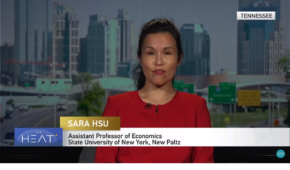
China promised to open up its financial industry under the pressure of the ongoing trade war. But the industry was not right away impressed: they had heard this song often enough. Financial analyst Sara Hsu looks at how China is keeping its promises this time and says the country is still underdelivering, she writes in China Focus.
Sara Hsu:
That doesn’t mean the measures are without merit in terms of promoting the health of China’s financial system. Certainly, allowing greater foreign participation will increase competition in China’s financial sector, which will promote the efficiency of the sector. Foreign firms will bring some best practices in management and operations that can filter over to Chinese domestic financial firms and force incremental efficiency gains. While foreign firms are unlikely to receive the lion’s share of business due to their lack of implicit state guarantees, they offer an important point of comparison for domestic Chinese firms that are used to carrying out business in a more bureaucratic manner.
There is also the hope that foreign small and medium sized financial institutions will enter the market and promote inclusive finance. Chinese financial firms have long struggled to provide financial services to smaller firms, which are considered higher credit risks. In addition, Dong Xiwei, deputy dean of the Chongyang Finance Research Institute of Renmin University of China, states that removing the asset restrictions of foreign financial institutions into China’s financial sector will help to introduce small and medium-sized foreign-funded financial institutions that can ultimately change the uneven development of domestic financial institutions and diversify the financial system.
Increased foreign presence in China’s insurance industry will push forward development of this sector. Some experts believe that this will increase the types of insurance firms in China as well as improve the shareholding structure. This will result in the expansion of insurance coverage, which is at a relatively low base.
The upshot is that the measures are a step in the right direction, but they aren’t the steps toward opening that overseas investors have been waiting for. Sure, they allow foreign financial firms to get a piece of the pie in China, which is significant news. Still, due to the ongoing presence of capital controls, foreign firms will not be permitted to engage in large scale overseas arbitrage and investment, which would likely be more lucrative. Capital controls are likely to remain in place until China’s economy is back on the upswing. That could take years. Until then, we’ll do with the opening measures that have been granted. At least they’re a step in the right direction.
Sara Hsu is a speaker at the China Speakers Bureau. Do you need her at your meeting or conference? Do get in touch or fill in our speakers’ request form.
Are you looking for more financial experts at the China Speakers Bureau? Do check out this list.
